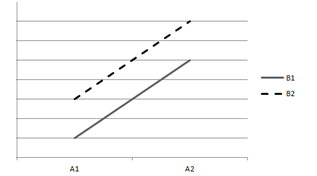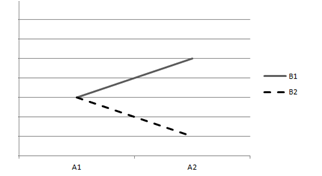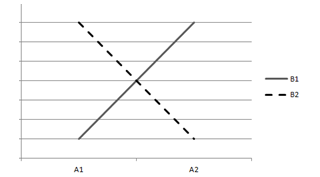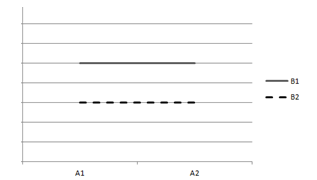Deck 2: Factorial Anova: Fixed-Effects Model
سؤال
سؤال
سؤال
سؤال
سؤال
سؤال
سؤال
سؤال
سؤال
سؤال

فتح الحزمة
قم بالتسجيل لفتح البطاقات في هذه المجموعة!
Unlock Deck
Unlock Deck
1/10
العب
ملء الشاشة (f)
Deck 2: Factorial Anova: Fixed-Effects Model
1
Questions are based on the following plots of cell means. Assume that the within-cell variation is very small.
(1) (2)
(2)  (3)
(3)  (4)
(4) 
-Which plot indicates that both main effects are significant but the interaction effect is nonsignificant?
A) plot (1)
B) plot (2)
C) plot (3)
D) plot (4)
(1)
 (2)
(2)  (3)
(3)  (4)
(4) 
-Which plot indicates that both main effects are significant but the interaction effect is nonsignificant?
A) plot (1)
B) plot (2)
C) plot (3)
D) plot (4)
A
(The two lines are parallel; the mean of B2 is higher than that of B1 across levels of A; the mean of A2 is higher than that of A1 across levels of B.)
(The two lines are parallel; the mean of B2 is higher than that of B1 across levels of A; the mean of A2 is higher than that of A1 across levels of B.)
2
Questions are based on the following plots of cell means. Assume that the within-cell variation is very small.
(1) (2)
(2)  (3)
(3)  (4)
(4) 
-Which plot indicates that neither of the main effects are significant but the interaction effect is significant?
A) plot (1)
B) plot (2)
C) plot (3)
D) plot (4)
(1)
 (2)
(2)  (3)
(3)  (4)
(4) 
-Which plot indicates that neither of the main effects are significant but the interaction effect is significant?
A) plot (1)
B) plot (2)
C) plot (3)
D) plot (4)
C
(The two lines are obviously not parallel; A1 and A2 have the same aggregated mean; B1 and B2 have the same aggregated mean.)
(The two lines are obviously not parallel; A1 and A2 have the same aggregated mean; B1 and B2 have the same aggregated mean.)
3
Questions are based on the following plots of cell means. Assume that the within-cell variation is very small.
(1) (2)
(2)  (3)
(3)  (4)
(4) 
-Which plot(s) indicate(s) significant interaction effects?
A) plot (1) and (2)
B) plot (2) and (3)
C) plot (1), (2), and (3)
D) plot (1) and (4)
(1)
 (2)
(2)  (3)
(3)  (4)
(4) 
-Which plot(s) indicate(s) significant interaction effects?
A) plot (1) and (2)
B) plot (2) and (3)
C) plot (1), (2), and (3)
D) plot (1) and (4)
B
(Nonparallel lines suggest that an interaction may exist. )
(Nonparallel lines suggest that an interaction may exist. )
4
The results of a two-factor ANOVA (J = 3, K = 2) show that both main effects are significant, but the interaction is not significant. We need to
A) conduct MCPs to examine the two main effects and the interaction
Effect.
B) conduct MCPs to examine the interaction effect only.
C) conduct MCPs to examine the two main effects.
D) conduct MCPs to examine one main effect only.
A) conduct MCPs to examine the two main effects and the interaction
Effect.
B) conduct MCPs to examine the interaction effect only.
C) conduct MCPs to examine the two main effects.
D) conduct MCPs to examine one main effect only.

فتح الحزمة
افتح القفل للوصول البطاقات البالغ عددها 10 في هذه المجموعة.
فتح الحزمة
k this deck
5
Questions are based on the following ANOVA summary table (fixed effects):

-For which source of variation is the null hypothesis rejected at the .10 level of significance?
A) A
B) B
C) AB
D) All of the above.

-For which source of variation is the null hypothesis rejected at the .10 level of significance?
A) A
B) B
C) AB
D) All of the above.

فتح الحزمة
افتح القفل للوصول البطاقات البالغ عددها 10 في هذه المجموعة.
فتح الحزمة
k this deck
6
Questions are based on the following ANOVA summary table (fixed effects):

-How many cells are there in the design?
A) 6
B) 8
C) 9
D) None of the above

-How many cells are there in the design?
A) 6
B) 8
C) 9
D) None of the above

فتح الحزمة
افتح القفل للوصول البطاقات البالغ عددها 10 في هذه المجموعة.
فتح الحزمة
k this deck
7
Questions are based on the following ANOVA summary table (fixed effects):

-The total sample size for the design is which one of the following?
A) 131
B) 132
C) 134
D) None of the above

-The total sample size for the design is which one of the following?
A) 131
B) 132
C) 134
D) None of the above

فتح الحزمة
افتح القفل للوصول البطاقات البالغ عددها 10 في هذه المجموعة.
فتح الحزمة
k this deck
8
Questions are based on the following ANOVA summary table (fixed effects):

-For which source of variation is the null hypothesis rejected at the .05 level of significance?
A) A
B) B
C) AB
D) All of the above.

-For which source of variation is the null hypothesis rejected at the .05 level of significance?
A) A
B) B
C) AB
D) All of the above.

فتح الحزمة
افتح القفل للوصول البطاقات البالغ عددها 10 في هذه المجموعة.
فتح الحزمة
k this deck
9
Questions are based on the following ANOVA summary table (fixed effects):

-How many cells are there in the design?
A) 6
B) 10
C) 12
D) None of the above

-How many cells are there in the design?
A) 6
B) 10
C) 12
D) None of the above

فتح الحزمة
افتح القفل للوصول البطاقات البالغ عددها 10 في هذه المجموعة.
فتح الحزمة
k this deck
10
Questions are based on the following ANOVA summary table (fixed effects):

-The total sample size for the design is which one of the following?
A) 72
B) 74
C) 77
D) None of the above

-The total sample size for the design is which one of the following?
A) 72
B) 74
C) 77
D) None of the above

فتح الحزمة
افتح القفل للوصول البطاقات البالغ عددها 10 في هذه المجموعة.
فتح الحزمة
k this deck








